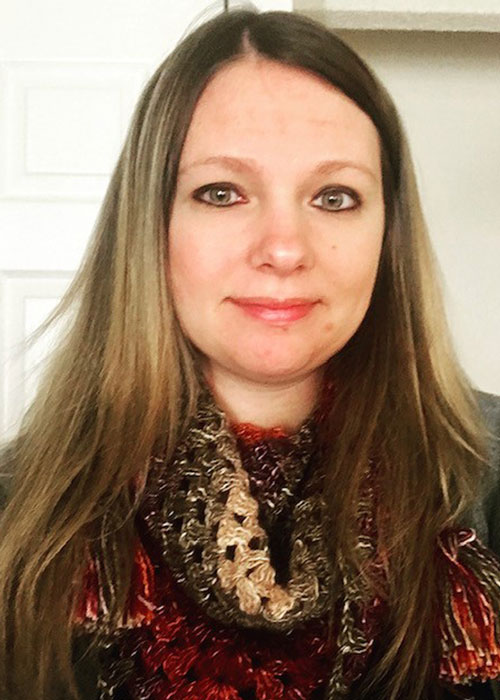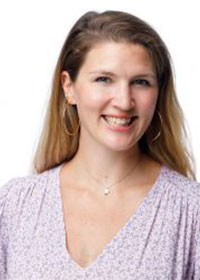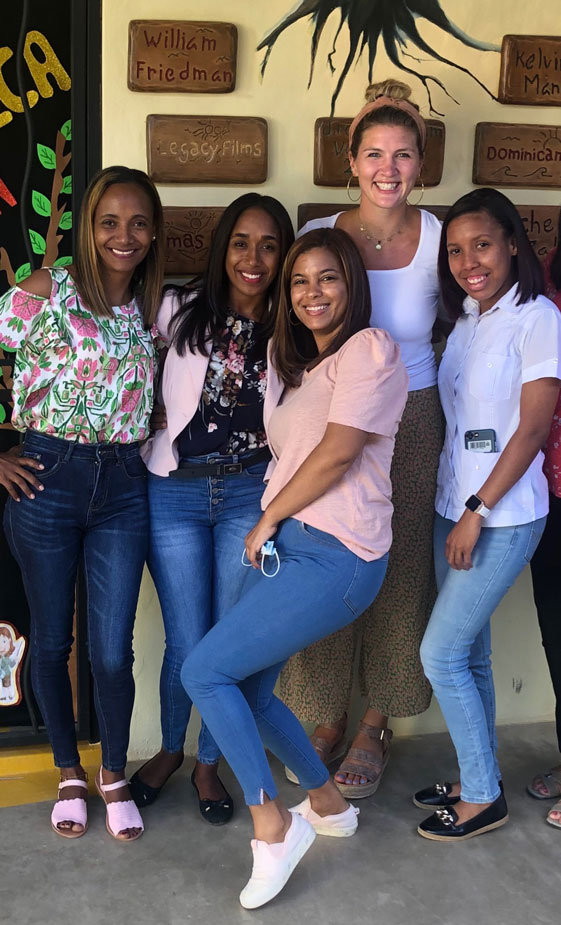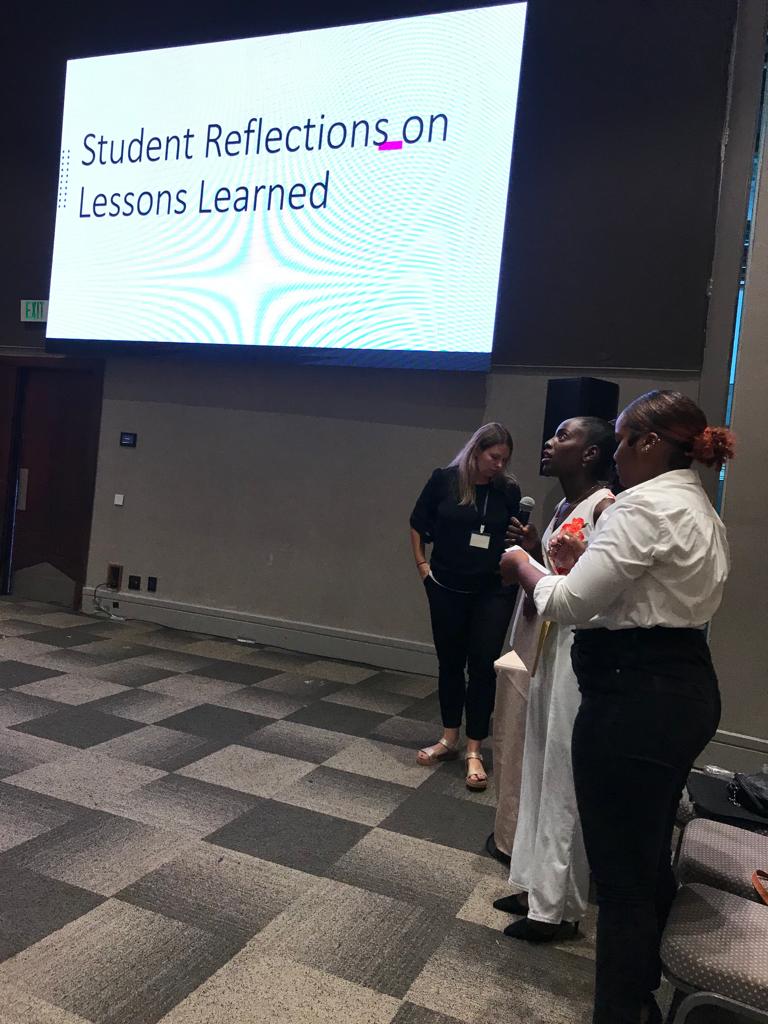Fulbright Chronicles, Volume 2, Number 1 (2023)
Authors
Molly Hamm-Rodríguez and Megan Jeanette Myers
Abstract


The authors represent a Fulbright US Scholar and a recipient of the Fulbright Doctoral Dissertation Research Abroad (DDRA) award. We initially met at a community event on the Dominican-Haitian border in 2012 and, a decade later, reconnected during our Fulbrights in the Dominican Republic. Our efforts to center community partners throughout our projects led to unique reflections about understanding the organization of community-based research, valuing student perspectives, and determining how to best leverage previous in-country experiences.
Keywords
Dominican Republic • community-based research • high-impact practices • Fulbright US Scholar • Fulbright Doctoral Dissertation Research Abroad
Introduction: Intersections of a Fulbright Scholar and Fulbright DDRA recipient in the Dominican Republic
Fulbright not only offers opportunities for students and scholars to make new connections with international colleagues and community members, but also serves as a mechanism to bring together US-based interdisciplinary researchers. We represent two recent Fulbright Fellows, a Fulbright US Scholar and a Fulbright DDRA award recipient, who worked in the same community of Cabarete, Dominican Republic. Despite our varied backgrounds in-country and differences in our formal academic training, our research and Fulbright experience led to similar conclusions and reflections about our respective projects. Methodological practices that place communities at the forefront, namely community-based research and engaged scholarship, served to guide our work. The present article traces our understanding of the role of community partners in Fulbright research, extending beyond the traditional model of a college or university serving as the primary point of contact and support for Fulbrighters. In particular, we focus on the role that local students–both at the high school and university levels–can fulfill as unofficial community partners. We explore frameworks of community-driven research and engaged scholarship and reflect on what these pedagogical models looked like for us in the Dominican context. We also reflect on our own trajectories in-country and consider how decades of previous work prepared us for our Fulbright experiences. Finally, we center our personal experiences by considering what being a Fulbright Scholar or Fulbright DDRA recipient offers an individual beyond research output: community, friendships, and collaborations.
Collaboration as Key: Centering Community
Both of our projects–detailed in the following paragraphs–share common threads in striving to center community needs and voices. Albeit with different research motivations and end-goals, we both worked with the same non-profit (The DREAM Project) to position community partnerships as essential to our work and research. Community-based research (CBR) is a methodological practice that stresses collaborative partnerships between scholars and the communities in which the research takes place. CBR underscores the importance of not just producing research for a specific community or disseminating research in a specific community, but instead working with and alongside community partners to define research questions and design research projects. CBR also endeavors to amplify community needs and make space for communities to tell their own stories. CBR in many ways parallels community-based learning (CBL) in that it emphasizes the need for meaningful community engagement. CBL, however, is a teaching and learning strategy as opposed to a methodological research practice. As a pedagogical approach, CBL encourages instructors to connect course content to advances in community-based and social knowledge. Keystones of both CBR and CBL include responding to community-identified needs and building mutually beneficial partnerships and reciprocal relationships between university and community partners.
Molly’s Fulbright Project
I came to the Dominican Republic in 2021-2022 as a recipient of the Fulbright DDRA award. As an educator, I sought to investigate dominant discourses about youth language and literacy practices–including from the perspective of state, NGO, and other institutional actors–in relation to youth’s own perspectives on their practices. I spent four months conducting participant observations and co-teaching English classes within a youth workforce development program hosted in both Cabarete and Puerto Plata. After working with 80 students (18-24 years old) in these classes, I recruited 18 of them to participate in a series of workshops on language and social justice that culminated in youth developing their own action research projects on topics of interest. In addition to teaching and learning relationships with students, the most important aspect of cross-cultural knowledge building and exchange occurred by collaborating on the design and delivery of workshops with Dominican and Haitian activists and educators. This process ensured that the workshops were grounded in transnational learning as we addressed the unique contexts of bilingualism and social issues of migration in the United States, Dominican Republic, and Haiti. These collaborative learning experiences have built the foundation for long-term engagement and impact, as we plan to continue developing projects together over the next few years.
Megan’s Fulbright Project
My Fulbright US Scholar Award in Research & Teaching built on my research related to Caribbean literature and my experiences teaching CBL courses at the university level. With regards to research and explicitly related to my teaching assignment in the Dominican Republic, I studied the impact of CBL courses for Dominican university students while teaching a literature course at the Technological University of Santiago (UTESA) in Puerto Plata. As part of the community-engaged course, my university students planned and facilitated workshops on literary analysis at DREAM. Each student group used active learning strategies to introduce groups of high school students to literary analysis in an engaging way that encouraged student involvement. The joint research and teaching award allowed me to bring community engagement into the classroom and to bring the classroom into the community. In this way, my Fulbright experience successfully merged my teacher-scholar profile and helped me to emphasize the degree to which my research informs and impacts my teaching and, likewise, my teaching informs and impacts my research. As a related output to my Fulbright research project, I have a forthcoming article in the International Journal of Research on Service Learning and Community Engagement (IJRSLCE). Further, as a direct connection to my teaching, I am planning to return to my host institution in the Dominican Republic in the future to offer a workshop on Active Learning for university instructors.
Students as Partners
Although both of our projects involved partnerships with institutions whose infrastructure, resources, and collaboration generously supported our work, our focal partners were the students themselves. Because community-based research and community-based learning is focused on larger social issues that extend beyond the walls of institutions, partnerships must center student needs even when those might contradict other program and policy priorities. CBR and CBL allow for students and community partners to have agency over the topics, pedagogical strategies, and projects that are of interest to them. This approach may look different across projects. For example, it is not necessary for students to have 100% control over all decisions for a project to be participatory. Most participatory projects in educational spaces include structured learning opportunities alongside student-led action. In addition, the final products or outcomes valued in partnerships are not always the same for all participants. Students may not have any interest in co-authoring a research article despite such work being a high priority for academics. The heart of participatory work is active listening, negotiating decisions, and decentering the researcher’s agenda.
In Molly’s project, initial entrance interviews with youth participants supported workshop development as ideas that were frequently expressed in the interviews were incorporated in learning activities. Although Molly had planned for students to do participatory action research projects on language-related topics, she followed their lead and gave students’ options to choose social issues instead. In the end, all students decided to choose a social justice topic, such as food insecurity and mental health, for their final projects. For Megan, many of her students were in-service teachers. Given their experiences in secondary education, Megan was able to scaffold in-class activities during the class meeting times; one of the most dynamic activities was a human timeline in which the students had to re-order the plot of a short story (each with a sentence or two that they had to put in chronological order by forming a line at the front of the classroom). Megan also encouraged the university students to develop activities for the literary workshop that actively engaged the workshop attendees in the learning process; the university students used the active learning strategies modeled in class as inspiration. In short, our collaborations with students changed the trajectories of our respective projects.
Molly’s Personal and Professional Trajectory in the Dominican Republic
I first traveled to the Dominican Republic in March 2011 as a Master’s student in Dr. Lesley Bartlett’s course on Curriculum and Instruction in International Contexts at Teachers College, Columbia University. The course paired students with institutions that had a specific curricular, professional development, or policy need, and teams of graduate students were assigned to support their work. My team was paired with The DREAM Project, a relationship that Dr. Bartlett had established as a Fulbright Scholar (2008) and Fulbright-Hayes Faculty Fellow (2009) in the Dominican Republic. I returned to work as a volunteer coordinator for DREAM’s summer camp in summer 2011, and was hired full time as a Monitoring, Research, and Evaluation Coordinator when I graduated in May 2012. Over a five-year period, I was promoted to Associate Director. In this role, I had the opportunity to work with numerous Fulbright fellows who visited and/or worked with DREAM during their fellowship years, an experience that sparked my interest in applying for a fellowship in the future. From 2012-2017, I led and coordinated several initiatives for youth and teachers, including large subgrants from USID and the US Embassy. I have spent time in countless schools, classrooms, and homes in the Dominican Republic, and have always approached my work through participatory and community-based methods that center the voices of staff members, public school teachers, students, and families. My dissertation research is grounded in my experiences listening to the deficit ways that students and teachers are often framed in the country as well as hearing students and teachers recount their frustrations with how their aspirations and desires are often thwarted by systemic inequities. I was also personally frustrated by the ways that education projects in the country frequently contribute more to social reproduction than to social transformation. Coursework, research, and teaching experiences in my doctoral program provided necessary theory and models for returning to the country and designing a research program that could support students (and myself as researcher) in developing critical consciousness and cross-cultural solidarities.
Megan’s Personal and Professional Trajectory in the Dominican Republic
My first long-term visit to the Dominican Republic took place in 2009 when I volunteered at a literacy center on the organic coffee farm (Finca Alta Gracia) previously owned by Julia Alvarez and her husband, Bill Eichner. I then returned in 2010 and 2011 to run summer literacy programs at the same farm. Since 2012, I have traveled nine times to the northern border towns of Dajabón (Dominican Republic) and Ouanaminthe (Haiti) for Border of Lights (BOL). BOL is a volunteer collective that I helped to found and of which I currently serve as a lead organizer. In broad terms, BOL seeks to commemorate the lives of Haitians and Dominicans of Haitian descent that were lost as a result of the 1937 Massacre. Additionally, it celebrates the solidarity and camaraderie that exists along the Dominican-Haitian border. On various occasions, I have taught summer classes at the Mariposa Foundation, an educational non-profit for girls based in Cabarete, and I have also led study abroad programs. While my experiences in-country are diverse and span several geographical regions, education serves as a common thread; such experiences working with Dominican youth—both in formal and informal educational settings—fostered my interest in pursuing teaching in the country at the university level as a Fulbright Scholar. In addition to a background in education in the Dominican Republic spanning nearly 15 years, I also define as a Caribbeanist and Dominicanist and I primarily publish research on Dominican and Dominican American literature. My first research monograph, Mapping Hispaniola: Third Space in Dominican and Haitian Literature (2019), looks at interpretations of third space(s) in Dominican and Haitian literature and my current project explores the intersections, both literary and otherwise, between Dominican American Julia Alvarez and Haitian American Edwidge Danticat.
(Re)-Connecting as Fulbrighters in the Dominican Republic
With a combined 25+ years of personal and professional experiences in the Dominican Republic prior to our recent Fulbrights, we shared similar motivations for returning to the country where we already had invested so much of our time. While some Fulbrighters hope to make new connections when they apply to conduct research and teaching projects around the world, we instead endeavored to strengthen existing connections and collaborations. At the same time, we embarked on new projects, engaging with students with whom we had not worked previously. When we (re)connected through the expansive network of past, current, and future Fulbrighters in the Dominican Republic, we quickly realized that we were in the same town and had similar contacts. As the Spanish saying goes, el mundo es un pañuelo (like the saying in English, “the world is small”)—and it feels even smaller when you have both been visiting the same area(s) of the country for years. We realized after looking through old photos that we had met in 2012 at the Dominican-Haitian border during Border of Lights events. We also both received FLAS grants (Foreign Language and Area Studies award) as graduate students to learn Haitian Kreyòl at Florida International University.
Speaking Kreyòl differentiates us from some other scholars working in the country and this language skill, in addition to a near-native level of Spanish, allows us to connect with both Haitian, Dominican, and Dominican of Haitian descent community members and students. From a personal perspective, we both traveled to the Dominican Republic on our Fulbrights with our families, including young children. While in Cabarete, our children played together and they were even enrolled in the same local swim class. The way Fulbright welcomes and encourages scholars and students with families makes the program unique and was a major factor in our interest in the fellowships. Traveling with our families, without a doubt, also connected us to the communities where we worked and lived in profound ways. Our own cross-cultural understanding was positively impacted by witnessing our families’ connections to local language and cultural practices, allowing us to better comprehend what living in a country other than the US teaches children and youth about diversity.
Not only did our Fulbrights in the Dominican Republic give us the professional opportunities to conduct community-based research projects and model community-based learning in-country, but we also had important takeaways about the roles of our students as integral parts of our Fulbright communities.
Final Reflections
Community serves as the foundation of our collaborative reflections on our experiences as a Fulbright US Scholar and a recipient of the Fulbright DDRA award. Not only did our Fulbrights in the Dominican Republic give us the professional opportunities to conduct community-based research projects and model community-based learning in-country, but we also had important takeaways about the roles of our students as integral parts of our Fulbright communities. Both of our projects aimed to center our students’ agency and to engage them as active and valued community members; our Fulbright projects contributed to our own knowledge in the fields of CBR and CBL as they forced us to be flexible, work through challenges, and to adjust our understandings of collaboration in cross-cultural contexts. Finally, in relation to community in a broad sense, we extended our own in-country networks during our Fulbrights, fully recognizing the importance of personal and professional community-building.
Notes
- For more information on Border of Lights, see the open access Border of Lights Reader, https://www.fulcrum.org/concern/monographs/1v53k057r or www.borderoflights.org.
- For further reading on interdisciplinary studies on Haiti and the Dominican Republic, see Transnational Hispaniola (University of Florida Press, 2018), edited by April J. Mayes and Kiran C. Jayaram.
- To learn more about participatory research, navigate to this online resource on leading Youth Participatory Action Research projects, https://yparhub.berkeley.edu/.


Biography
Megan Jeanette Myers is an Associate Professor of Spanish at Iowa State University. She is the author of Mapping Hispaniola: Mapping Third Space in Dominican and Haitian Literature (2019) and the co-editor of The Border of Lights Reader: Bearing Witness to Genocide in the Dominican Republic (2021). Myers is a Center for Excellence in Learning and Teaching (CELT) Faculty Fellow at Iowa State University and a past Iowa Campus Compact Engaged Scholar Fellow. She publishes regularly on Caribbean and Latino/a/x literatures and in the fields of the Scholarship of Teaching and Learning (SoTL) and Languages for Specific Purposes (LSP). She can be reached at mjmyers@iastate.edu, Puerto Plata and Cabarete, Dominican Republic, Fulbright US Scholar, January 2022-June 2022.
Molly Hamm-Rodríguez is a PhD candidate in Equity, Bilingualism, and Biliteracy in the School of Education at the University of Colorado Boulder. She has published two book chapters on the education system in the Dominican Republic, with additional research on language and literacy practices in the country and diaspora published in Applied Linguistics and archipelagos: a journal of Caribbean digital praxis. She was a Community-Based Research Fellow at CU Boulder’s CU Engage and has been involved in community-based learning initiatives for more than 15 years. Molly is an active member of the American Anthropological Association and Caribbean Studies Association. She can be reached at molly.hamm@colorado.edu, Puerto Plata and Cabarete, Dominican Republic, Fulbright Doctoral Dissertation Research Abroad program, September 2021-August 2022.
